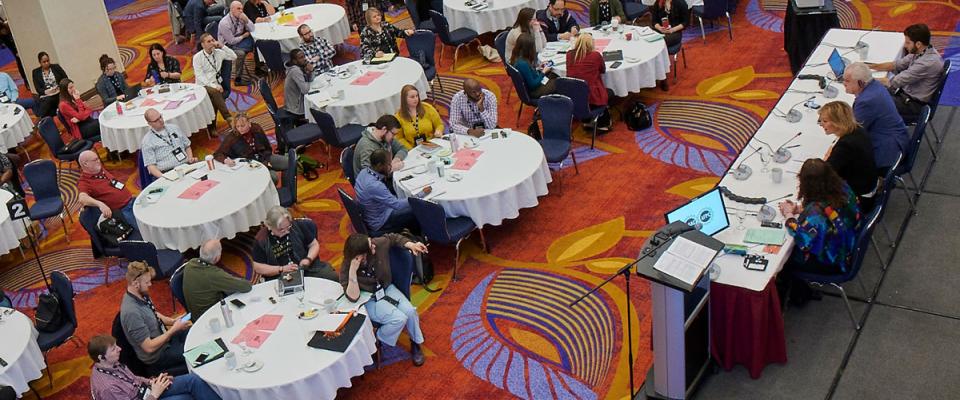For the first time in PSAC’s history, representatives of every bargaining unit of university workers were invited to take part in a university roundtable, which took place in Ottawa from March 25 to 27.
The university sector membership of the union has been growing in recent years, and now includes over 23,000 members in 57 bargaining units across Canada. Working conditions in the university sector are highly precarious and jobs are mostly temporary, which creates unique and significant challenges for union locals and members in this sector.
Delegates put issues on the table in dialogue with PSAC national leaders
PSAC National President Chris Aylward and Vice President Magali Picard were there to hear directly from members about how university locals can engage with all levels of the union and how PSAC can better support them.
Delegates asked for better communication and information-sharing, more resources and tools from the national and regional offices, and greater access to PSAC decision-making. They offered creative and innovative ideas on how we can work better together within the union.
The leaders responded. Both Aylward and Picard provided commitments to the delegates that PSAC will provide more resources and improve communications, including sharing more information on our national website, and that the union’s leadership hears and supports their voice.
Collective bargaining: Issues and challenges
Delegates were divided into three groups – based on their job category – for workshops on collective agreement language and opportunities for gains in bargaining.
Workshop participants raised several key issues, many of which were common among all three groups:
- whistleblower protections
- top-ups to benefits (parental and disability)
- child care benefits
- job security
- wage increases, including cost of living adjustments
- wages/benefits need to compensate for tuition hikes (especially for international students)
- human rights protections
Participants also discussed challenges to getting collective agreement improvements, such as the difficulty of long negotiations when the membership are often on short contracts. They also shared ideas about how the union can build on successes. All groups showed a strong appetite for better sector coordination, nationally and regionally.
In a second set of workshops, delegates brainstormed on how to win great collective agreements through various strategies and actions, sharing successful examples of tactics that have led to success. They also discussed the best ways to engage members in bargaining and other types of mobilization.
Building strong locals, working together
Delegates participated in a “fishbowl” exercise, where they were able to hear and participate in a small group discussion about how we can build stronger locals. The discussion included recent and seasoned local activists, who shared advice and brainstormed about building power locally.
Participants agreed that strong locals:
- build membership engagement by winning
- are not afraid to ask members for resources
- use a diversity of tactics to reach members
- provide multiple opportunities for membership engagement
- talk about things that matter to members
Next, a panel of PSAC staff offered information about what services and assistance the PSAC national and regional offices can provide for locals. Panel members talked about front line representatives, communications, legal and other staff who provide assistance with grievances, communication to members, lobbying, bargaining and many other areas.
During the event, delegates also had the opportunity to have one-on-one conversations with PSAC Special Projects Officer Michele Girash to talk about the challenges of precarious work. These conversations will form part of our information-gathering work to support the actions taken on the resolution on precarious work (passed at the 2018 PSAC National Triennial Convention).
How to build union power
On the final day of the event, American union activist and educator Barbara Madeloni addressed the room in an inspiring call to action. Madeloni spoke about recent examples in the US of successful organizing and mobilizing campaigns in the education sector and gave her advice on the best ways to engage and motivate union members and the public to win their support.
“We’re going to win by creating in our struggles, through our struggles, the new world that we want to create,” said Madeloni. “Little by little we are going to transform the world”.
 Member Login
Member Login



